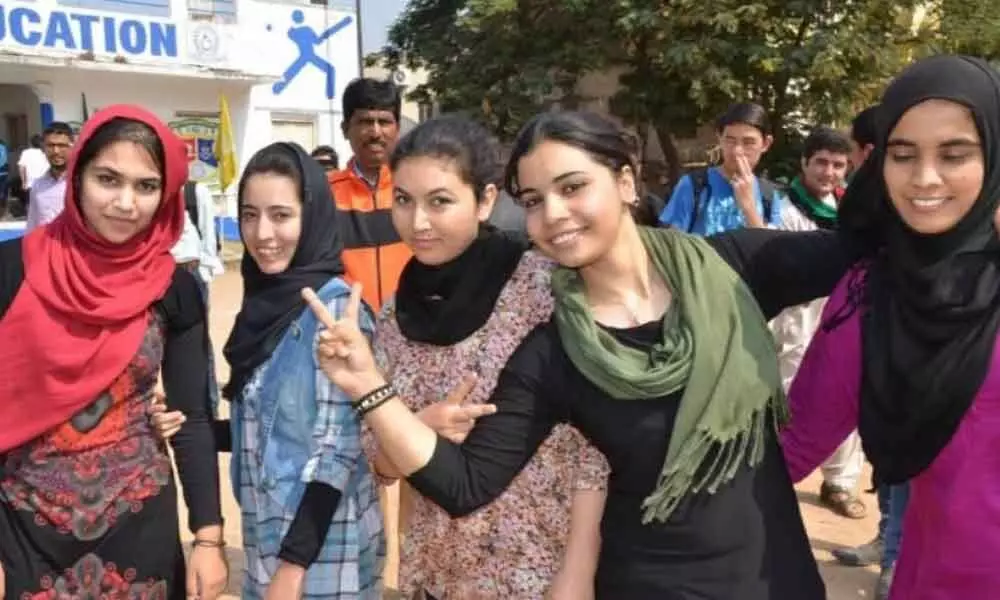Higher education in AP, Telangana needs total makeover

The research grants and higher education budget allocated for prominent universities in Andhra Pradesh and Telangana saw a drop in the previous years
The research grants and higher education budget allocated for prominent universities in Andhra Pradesh and Telangana saw a drop in the previous years.
In what makes a dismal scenario for academia, none of the 20 State universities in combined Andhra Pradesh figures in the list of 'Universities with Potential for Excellence' (UPE) of the University Grants Commission (UGC).
While AP has no representation in the coveted list of 15 universities, only two from Telangana find their place among them. This reflects the poor situation of the State universities in AP and Telangana.
All the famous universities also failed to find a place in the list. For the UPE tag, universities are judged by various parameters which include, high level research activities, quest for excellence, infrastructure, faculty-student ratio, university-industry collaboration and community outreach.
One of the main benefits of getting the UPE tag is the grant of Rs 100 crore from UGC for strengthening a university's focus areas, collaborating research projects cutting across various disciplines, encouraging other departments for research and for also improving infrastructure.
The UGC is also planning to select 'Universities of Excellence' for which a grant up to Rs 150 crore will be provided by the UGC. Other main benefits include the brand image improvement of a university if it is recognised as a UPE.
Lack of required number of faculty in State universities is a major reason why they could not make it to the list, especially Andhra University, Osmania University, Sri Venkateswara University and JNTU.
While the number of teaching members has gone down, the number of departments, courses and students has increased. AU, OU and SVU once used to be brimming with more than 1,300 professors which have now dwindled to a few hundred.
Another major issue is lack of funds. Most of the funds received go towards payment of salaries and basic expenditure. There are not enough funds to develop a world class infrastructure or conduct many workshops. If universities receive enough funds, institutes will outshine many premier institutes.
Indian education system might need an overhaul as it needs to cover more students, add infrastructure and most of all — improve the quality of education. It might have to do all this on a threadbare budget.
Though the country's education budget has improved over the years, it is not enough to match its needs. According to the government think tank Niti Aayog, India should increase the education expenditure to nearly 6% of the GDP over the next three years — which is 4.6% of GDP as of now.
Poor quality of education is one of the many risks that India faces — adding to its unemployment crisis.
India ranks third in terms of education score of BRICS nations (Brazil, Russia, India, China, South Africa). Amongst South Asian countries, India has the second-lowest score in education quality, ahead only of Afghanistan.
However, the advent of digital technologies has given rise to upskilling practices, which calls for government aid as they add more skills to match the digital world needs. The government should provide some support in the form of incentivising companies investing in the reskilling, upskilling of their workforce for the digital age.
With the shortage of skilled workforce in the deep tech sector, reskilling of employees in AI, ML, IoT will help grow India's IT sector and sharpen its competitive edge amidst the changing business landscape.
In July 2019, the government said that it would now assimilate grants given by independent Ministries and integrate the funds to the National Research Foundation (NRF) — to accelerate the growth of research studies in the country. However, it said that it would identify the trust areas of 'national importance' for the allocation of the funds.
Large Free Trade Zones would need to be set up to create India's Silicon Valley. Given our cost structure, India could lead in R&D development that would complete the cycle from education to job creation.
If we are focussed on the right to education, the quality of education is equally important, and the government may look to allocate budget to improve education facilities.
Though Ministry of HRD announced an initiative ' NISHTHA' to train over 4.2 million teachers across the country which is not successful.
The government of India has to work towards education policies and help incremental changes within the engineering and IT sector by supporting organisations to bring about a radical change.
Due to lack of insufficient funds, these new universities are unable to develop their respective campuses with all facilities required to get 12 (b) status from UGC, which includes land, buildings, teaching positions in the departments, student and staff amenities etc.
Due to unforeseen reasons like land acquisition, alienation, land utilisation etc., some of the universities could not take off as they desired. There is a lack of regulatory authority to control unauthorised colleges and universities offering programmes not recognised by appropriate authorities and to ensure standards and quality in private unaided institutions.
No proper regulatory mechanism is in place for conducting academic and financial audit in private unaided colleges. Inadequate or poor infrastructure including laboratories in newly established universities and colleges is another issue.
There is non-availability of sufficient grants to government and government administered aided institutions for salaries and maintenance.
They are unable to introduce industrial relevant and market driven courses and lack qualified and trained faculty. Insufficient number of academic staff colleges to train the teachers and no mechanism at State level to assess the quality of institutions through accreditation process also lead to the poor state of universities in Telangana and AP.
Due to bifurcation of the State, a number of educational and research institutes went to Hyderabad. Budget allocations for higher education are not satisfactory. States' financial position after bifurcation is not permitting additional funding on certain occasions.
The State governments should address higher education issues with top priority. Immediate action plan should be developed to refurbish the public and academic infrastructure in view of the ageing universities.
High priority should be given to accelerate faculty and staff recruitment by a strategic plan to overcome the procedural barriers.
Creation of opportunities to involve visiting and adjunct faculty from industry and superannuated academia will release the overburdened faculty for a better academic performance.
Faculty working in allied research areas belonging different disciplines are being formulated into teams with bigger scientific programmes for exploiting the major funding opportunities.
More thrust should be given on academia and industry interaction to take up collaborative research programmes for mutual benefit.
NRI and alumni support should be solicited to involve foreign faculty. Group networking should be planned to provide better communication on the ongoing and envisaged research programmes to generate interest in foreign scientists for collaboration and exchange.
(Dr M Suresh Babu is State President, Praja Science Vedika, Hyderabad and Dr K Bhavana Raj, is Assistant Professor, Institute of Public Enterprise, Hyderabad. Views expressed are personal)














